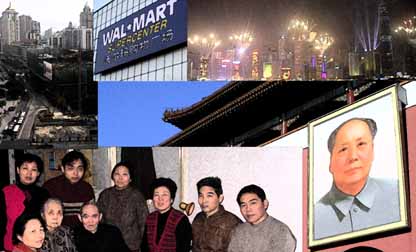 |
Journey
to My Home: Hong Kong and China Rediscovering the Meaning of Labor Activism, Being Chinese and Chinese Nationalism By: Lee Siu Hin |
Part One: Beginning of the Story
| Photo: My grandparents (left 2nd and 3rd sitting), my mother (left 1st sitting), my uncles and aunts and me (left 2nd standing) during my family visits at Weifang, China at China's Spring Festival (A.K.A. Chinese New Year) |
I was born in Hong Kong, which I left 19
years ago to come to the United States. Before I moved to this country
I was a student and labor activist, witnessing many historical events
and transformations in China and Hong Kong.
I have many good memories about my home, and many bad memories about my
past life from which I want to move on, but it's my destiny to go back
to my home-Hong Kong and China, to face my past, and visit my grandparents
in Weifang, China. So in January 2004, during China's Spring Festival
holiday (A.K.A. the Lunar New Year or Chinese New Year) I went back to
visit my family, to witness the great changes in my country, so that I
could overcome the fear of my past, understand the present, and start
a new future.
This was the first time in decades I had seen my grandparents in China,
and my first in-depth trip to my country since 1990. I needed to witness
firsthand what is happening in China today. My country had become so "foreign"
to me that my father kept telling me: "Please come back to see your
country; it has changed so much since you were last here so long ago."
This trip has been a cultural shock for me. The last time I was in China,
over 10 years ago, there were no cell phones, no freeways, no McDonald's,
no Internet and no Wal-Mart store (yes, there are a dozen Wal-Mart stores
in China). This has been a huge learning experience.
This was a journey for me not only to rediscover myself, but also a journey
to rediscover my country, my people, and people from the two nations-China
and United States, and to see how the social justice and anti-globalization
movements have been affected by the changes in Chinese and Hong Kong society.
With my recent trip to Iraq on July 2003, I had a unique, first-hand basis
of knowledge I could use to compare China, Iraq and the United States.
I needed to see with my own eyes the factories in China, the Chinese workers
in Starbucks coffeehouses drinking coffee and talking on cell phones,
and the behind-the-scenes connection of Hong Kong to international labor
movements.
Why is it important that activists understand Hong Kong? It's one of the
key links between international sweatshops, globalization, imperialism,
colonialism and the Cold War, since Chinese from Hong Kong, Chinese from
Taiwan, Chinese-Americans and Chinese-Canadians own most of the international
sweatshops. If labor and anti-globalization activists don't understand
the hearts & minds of Chinese, and what is happening in Hong Kong,
they won't understand sweatshops and how to act in solidarity with Chinese
people to effectively fight the anti-globalization movement. As Chinese
wisdom says: everything that happens must include the big picture and
the small picture, international elements and domestic reasons. International
activist movements must not fail to see the bigger picture in China, because
for Chinese it's not just a casual activist labor movement, it's also
our life, the destiny of our country.